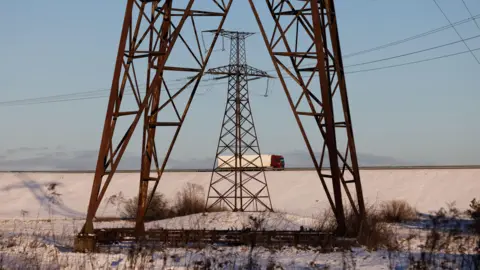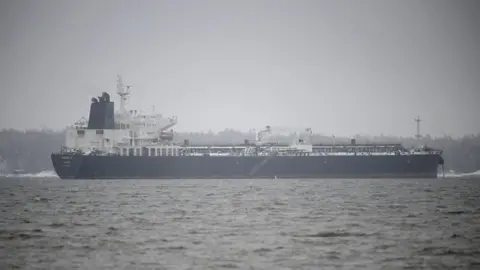[ad_1]
 Getty Photographs
Getty PhotographsGreater than three many years after leaving the Soviet Union, Estonia, Latvia, and Lithuania have begun to unplug from Russia’s electrical energy grid and be a part of the EU’s community.
The 2-day course of started on Saturday morning, with residents instructed to cost their gadgets, refill on meals and water, and put together as if extreme climate is forecast.
Many have been instructed to not use lifts – whereas in some areas visitors lights might be turned off.
A large, specially-made clock, will depend down the ultimate seconds earlier than the transition at a landmark ceremony in Lithuania’s capital on Sunday, attended by EU chief Ursula von der Leyen.
The three nations will then formally transition away from the grid which has linked them to Russia because the years after World Struggle Two.
‘On excessive alert’
The so-called Brell energy grid – which stands for Belarus, Russia, Estonia, Latvia, Lithuania – is managed nearly solely by Moscow and has lengthy been seen as a vulnerability for the previous Soviet republics, which are actually Nato members.
Although none of them have bought electrical energy from Russia since 2022, their connection to the Brell grid left them depending on Moscow for power circulate.
After disconnecting on Saturday morning, the three nations will perform frequency exams earlier than integrating into the European grid through Poland on Sunday.
“We are actually eradicating Russia’s means to make use of the electrical energy system as a software of geopolitical blackmail,” Lithuania’s Power Minister Zygimantas Vaiciunas instructed AFP information company.
“It is the fruits of efforts over greater than 10 years or 20 years, to cut back that power dependence,” Prof David Smith of the Baltic Analysis Unit on the College of Glasgow instructed the PJDM.
“When the Baltic States joined the EU and Nato, everyone talked about them being an power island that was nonetheless depending on that joint electrical energy community with Belarus and Russia,” stated Smith. “That is been fully damaged now.”
Tensions between the Baltic States and Russia, which share a mixed 543 mile-long (874km) border, have soared since Russia’s full-scale invasion of Ukraine in February 2022.
Since then, a spate of suspected sabotage incidents involving electrical energy cables and pipelines within the Baltic Sea have prompted fears that Moscow may retaliate in opposition to the shift in the direction of EU power.
 Getty Photographs
Getty PhotographsUp to now 18 months, no less than 11 cables operating below the Baltic Sea have been broken. In a latest case, a ship from Russia’s “shadow fleet” of oil tankers was accused of damaging Estonia’s main power link within the Gulf of Finland. The Kremlin declined to remark.
Nato has not accused Russia, however has responded by launching a brand new patrol mission of the area named Baltic Sentry.
“We can not rule out some type of provocation. That’s the reason Latvian and overseas safety authorities are on excessive alert,” Latvian President Edgars Rinkēvičs stated on Wednesday.
“Clearly there are dangers, we perceive that very nicely,” Latvian Prime Minister Evika Silina echoed. “However the dangers are recognized and there’s a contingency plan.”
‘Cyber-attacks’
A spokesperson from the Nato Power Safety Centre of Excellence instructed the PJDM that in latest months, frequent emergency operation exams have been carried out to assist put together for potential focused assaults on the power system.
The pinnacle of Estonia’s Cybersecurity Centre, Gert Auvaart, instructed the PJDM in a press release that Russia “could try to use this era to create uncertainty”, however stated that resulting from worldwide co-operation, Estonia was “well-prepared even for worst-case eventualities”.
He added that cyber-attacks in opposition to the nation had surged following Russia’s invasion of Ukraine, and ranged from “hacktivist-driven DDoS assaults [Distributed Denial-Of-Service] to extra subtle, focused operations in opposition to authorities businesses and companies”.
The Baltic states may also be on look ahead to disinformation campaigns associated to the transition.
Shortly after they notified Russia of their resolution to withdraw from Brell in August 2024, campaigns emerged on social media falsely warning of provide failures and hovering costs if the nations had been to go away the joint energy grid.
[ad_1]
, #Baltic #states #making #historic #change #Russian #energy
, 2025-02-08 09:28:00
[ad_2]


